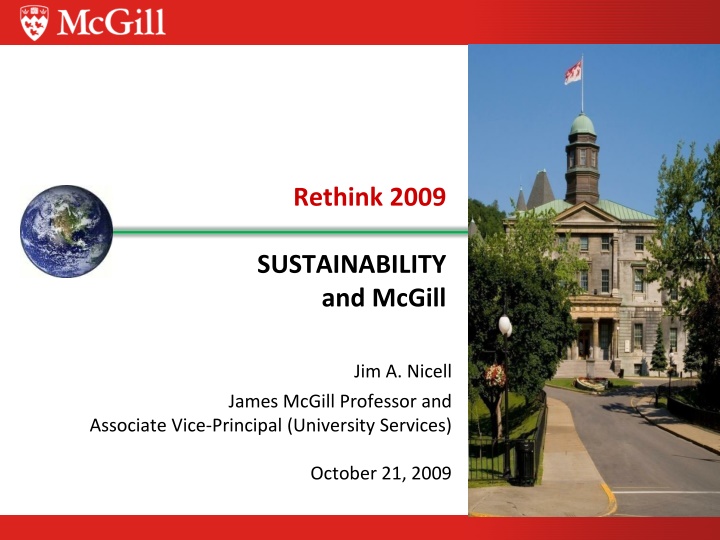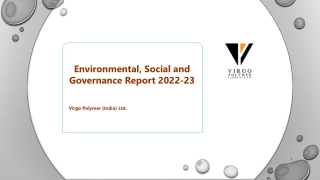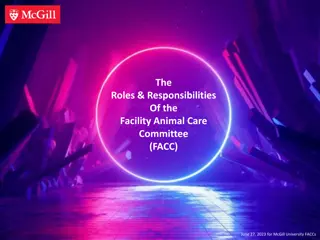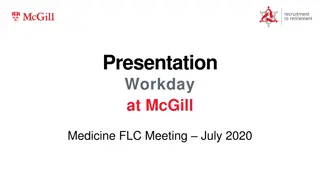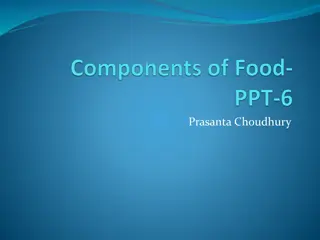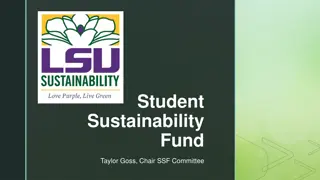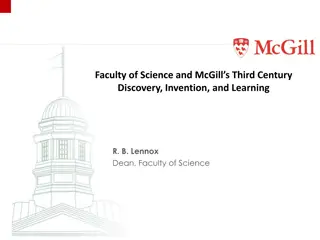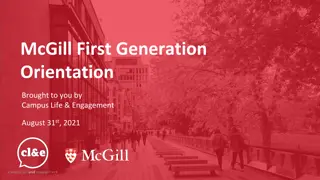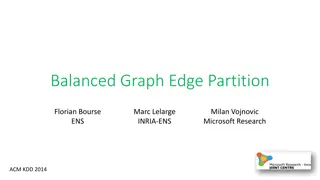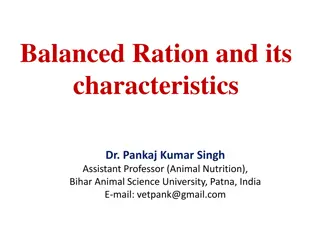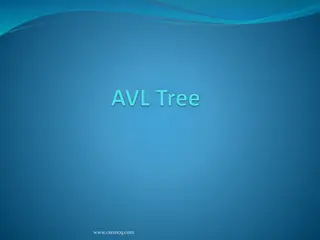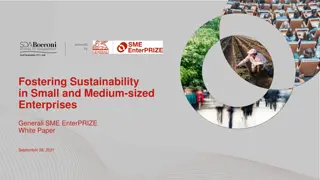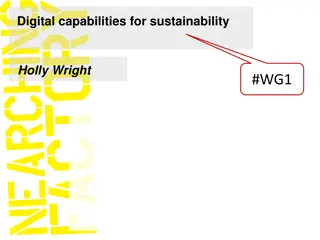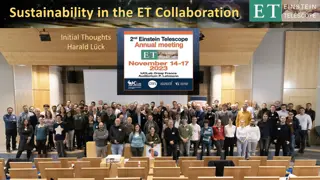Sustainability at McGill University: A Balanced Approach
McGill University aims to advance learning while emphasizing sustainability across its campuses and properties. The institution operates with a mission focused on teaching, scholarship, and societal service, all while striving to be a model for environmentally responsible living. Sustainability at McGill involves achieving a balance between social, economic, and environmental aspects, with shared responsibility among all stakeholders.
Download Presentation

Please find below an Image/Link to download the presentation.
The content on the website is provided AS IS for your information and personal use only. It may not be sold, licensed, or shared on other websites without obtaining consent from the author.If you encounter any issues during the download, it is possible that the publisher has removed the file from their server.
You are allowed to download the files provided on this website for personal or commercial use, subject to the condition that they are used lawfully. All files are the property of their respective owners.
The content on the website is provided AS IS for your information and personal use only. It may not be sold, licensed, or shared on other websites without obtaining consent from the author.
E N D
Presentation Transcript
Rethink 2009 SUSTAINABILITY and McGill Jim A. Nicell James McGill Professor and Associate Vice-Principal (University Services) October 21, 2009
McGills campuses BACKGROUND 2 campuses (Downtown, Macdonald), plus the MUHC Glen Campus 228 buildings of 780,000 sq.m. (680,000 downtown; 100,000 Macdonald Campus) Other major properties: Morgan Arboretum (245 ha); Nature Reserves including Gault (1,000 ha), Penfield (188 ha), and Molson (51 ha); Other: Bellairs Research Institute Estate (Barbados), Sub-Arctic Research Station (Schefferville, QC), McGill Arctic Research Station (Axel Hieberg Island, NU) Downtown: 36 ha Macdonald: 650 ha Gault Reserve: 1,000 ha Glen: 17 ha
BACKGROUND McGill s Mission The Mission of McGill University is the advancement of learning through teaching, scholarship and service to society: by offering to outstanding undergraduate and graduate students the best education available; by carrying out scholarly activities judged to be excellent when measured against the highest international standards; and by providing service to society in those ways for which we are well-suited by virtue of our academic strengths.
BACKGROUND McGill University strives to stand as a model for environmentally responsible living McGill University Physical Master Plan: Planning and Design Principles (Adopted April 7, 2008)
SUSTAINABILITY Fundamental Assumptions The mission of McGill University can only be attained responsibly by carrying out its activities in a manner that achieves a balance between the social, economic and environmental dimensions of sustainability Sustainable practices are everybody s responsibility and cannot be charged to individual persons or units. To achieve this, we must share a common vision.
Imagine a McGill where Our Mission is attained responsibly by carrying out the University s activities in a manner that achieves a balance between the social, economic and environmental dimensions of sustainability.
Imagine a McGill where Energy comes from clean and renewable sources and is produced and consumed efficiently. http://tbn1.google.com/images?q=tbn:Im4lD5MKKiC_SM:http://www.akmarine.org/our-work/address-climate-change/bulb_5.jpg Steam Demand 60,000 40,000 1,000 lbs steam 57,573 46,173 20,000 28,538 10,903 0 Existing Heat Recovered from Burnside North & West Modernize HVAC Corner & Middle Modernize HVAC
Imagine a McGill where Greenhouse gas emissions are a thing of the past; only renewable energy sources are used, power plants are modernized and efficient, buildings are carbon neutral, and vehicles are electric. GHG Emisions 4,000 3,000 tonnes 4,158 2,000 3,333 2,058 1,000 783 0 2008 2009 2010/11 200?(funding)
Imagine a McGill where Campus spaces are green, accessible and pedestrian friendly; buildings are carefully maintained and well situated in their natural, cultural and historic surroundings.
Imagine a McGill where Cars are left at home; staff, students and visitors arrive at our campuses by foot, bicycle or public transit. Montreal bus service 105 sherbrooke
Imagine a McGill where Water is used and consumed wisely.
Imagine a McGill where Food is produced locally and is chemical-free.
Imagine a McGill where Waste is minimized, consumption is reduced, items are purchased locally, and materials are reused or recycled before disposal.
Imagine a McGill where Students are educated as citizens of a global environment and gain the experience they need to become the leaders of tomorrow.
SUSTAINABILITY POLICY (Draft) Aspirations McGill University aspires to achieve the highest possible standards of sustainability on its campuses and in its day-to-day activities through its academic practices, in its facilities and their operations, and by its outreach to the broader community. We seek to be a leader in research and education, creating and communicating the knowledge required for humans to live sustainably at the local, regional and global scales.
SUSTAINABILITY POLICY (Draft) Aspirations We will meet or exceed in our operations governmental standards of sustainability for educational institutions and the norms of sustainability achieved by our comparator universities. Our goal is to become an institutional model of sustainability for society as we pursue our academic mission and to play a positive and proactive role in communicating the rationale and need to develop and implement sustainable practices in the broader community.
CONSULTATION Draft document available at http://www.mcgill.ca/sustainability/plan/ Send your comments and suggestions to: sustainability.policy@mcgill.ca
Rethink THE BIG QUESTIONS Can we agree on a common vision for a sustainable future and McGill s role in accomplishing this? Can we create a culture of sustainability at McGill? Can we foster enquiry into sustainability through teaching, research and the university experience?; For this Rethink conference, more specifically: How does the University exercise its role/responsibility in education for sustainability? How can professors become more sustainable in the practice of their vocation? How does the University community integrate education for sustainability in its programs?
